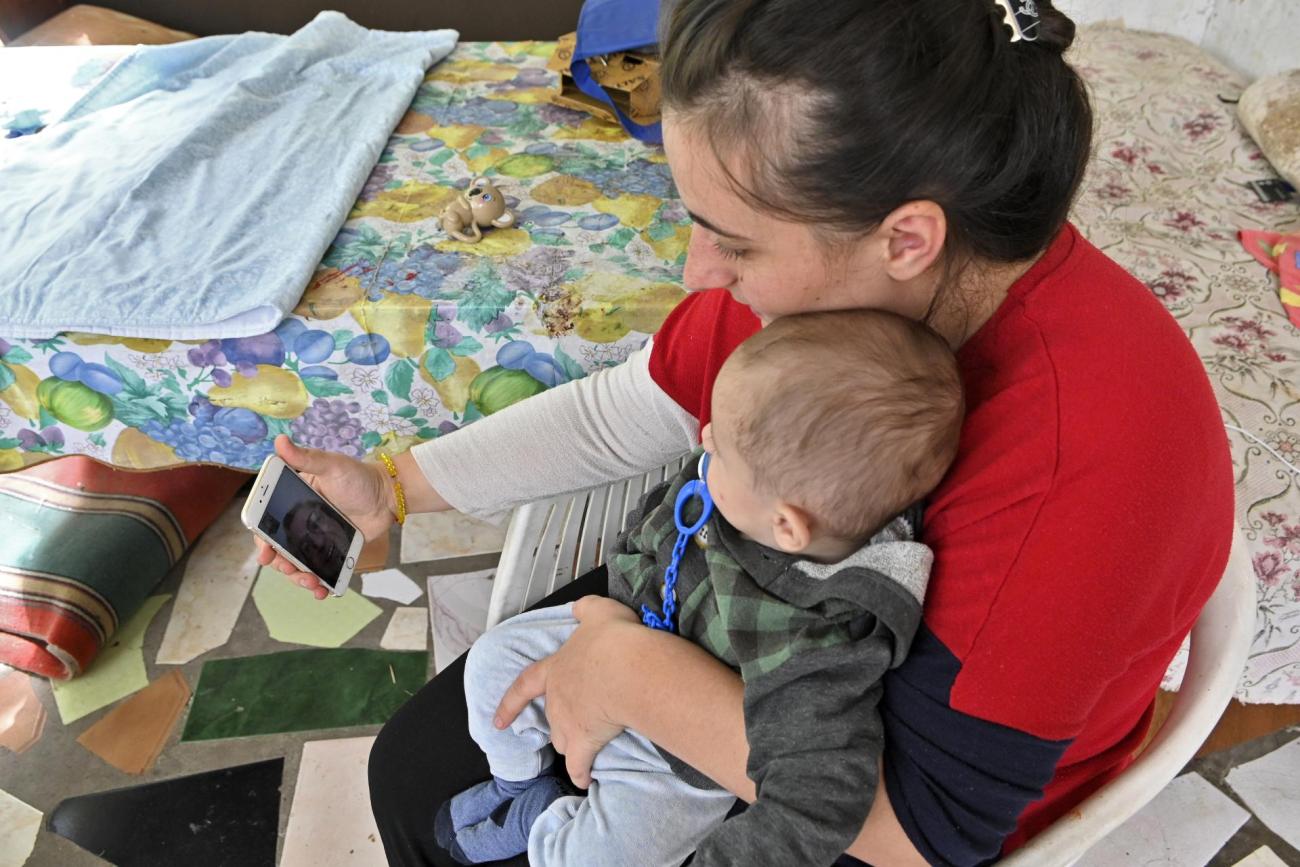Remote Care: How Telemedicine is Transforming Rural Health Care in Georgia

Impact of Telemedicine on the Lives of Children and Mothers in Remote Villages
Anna, 19, holds baby Saba with one hand and with the other, she fixes a spring scale the size of a medium plate on a tree branch in her yard. Saba is wearing special blue weighing trousers, which can be hung from the scale’s hook.
"We did it! Saba weighs 7 kilos and 200 grams," says Anna.
Anna is a young mother and spends most of her time at home caring for her baby. Her husband works at a construction site in the neighboring village and often comes home when Saba is asleep.
"Saba had a problem with gaining weight since birth. It made us very nervous," recalls Anna. "He was hospitalized several times. Recently, he was infected with the Coronavirus and lost even more weight."
The mechanical infant scale provided to rural clinics in Georgia by UNICEF is one small component of a concept called telemedicine, which is being implemented with the support of the European Union and UN agencies. A village doctor can temporarily give the scale to a family who needs to monitor a child's weight regularly.
The main principle of telemedicine is taking what used to require the physical presence of a doctor and a patient together in one room and making some of those services available remotely.
"Saba had to be weighed at the village clinic every five days. It was very difficult for me," says Anna. Her village has no public transport, and the clinic is two kilometers from her house.
"Hello, Anna, so what weight did the scale show today?" Maya Bezhanishvili, a family doctor in the village of Bazaleti, connects to Anna and Saba via video call from the village clinic. She notes Anna's response in Saba's personal history and calculates the rate of weight gain. The doctor is pleased. The baby has gained 200 grams in the last five days, a good indicator for 5-month-old Saba.
"Our clinic serves 18 villages, which are quite far from each other. The situation is complicated by the fact that there is no public transportation connecting the villages. Our region is mountainous, and reaching some villages even by car is difficult," says the family doctor. "Telemedicine allows us to assess the patient's condition and determine needs remotely, using an international evidence-based protocol, without visiting the family or having them come to the village clinic."
Remote monitoring of the child's development is only one telemedicine component, which has been introduced with the EU support in 50 rural clinics throughout Georgia. With the development of digital technologies to support telemedicine, family doctors in the pilot clinics are also being trained to work efficiently in the electronic system.
Telemedicine also connects rural doctors with fellow colleagues and specialists and can help to clarify diagnoses or determine treatment tactics. A rural doctor can pre-book a virtual meeting with a specialist or request to convene a virtual council of specialised service providers.
UNICEF/geo-2023/Valishvili
This means that a child living in a rural area whose challenge in development is detected by a rural doctor can receive a consultation from a child development specialist without leaving a rural clinic.
"I have been working as a village doctor for 25 years, and I know the needs and difficulties of the village population very well. Visiting a doctor in the capital city is a luxury for many families. If a specialist doctor consults the child remotely from a village clinic, it would be a great advantage for the family," says Doctor Maya.
With the support of the EU and UNICEF in Georgia, telemedicine will also be used in raising awareness among parents on child care and child development issues. Using a digital platform, the parents of 50 pilot clinic patients will have the opportunity to attend scheduled online meetings, which will be conducted by leading paediatricians, psychologists and nutrition specialists in Georgia.
During the online meetings, parents will have the opportunity to ask questions, get answers and share their experiences with other parents. UNICEF recommends the sustainable integration of these practices into the national health system.
The introduction of the EU-funded telemedicine will support building a sustainable primary healthcare system by ensuring equal access to services for all patients. The integration of telemedicine into the rural clinics of Georgia will contribute to the further development of universal health care.
About the project:
The project, “Minimizing the impact of the COVID-19 outbreak in Georgia through telemedicine and digital health solutions,” aims to harness the potential of digital tools for advancing telehealth services and promoting health in Georgia. This assistance is an integral part of the EU’s and UN’s support to the COVID-19 response in the country, as well as ongoing WHO technical assistance under the UHC-Partnership to support the commitment of national authorities to primary health care reform and the advancement of UHC in Georgia.
The project is implemented by four UN partners (WHO, UNFPA, UNICEF, UNOPS) under WHO leadership.
The article was produced with the assistance of the European Union. Its contents are the sole responsibility of the authors and do not necessarily reflect the views of the European Union.

